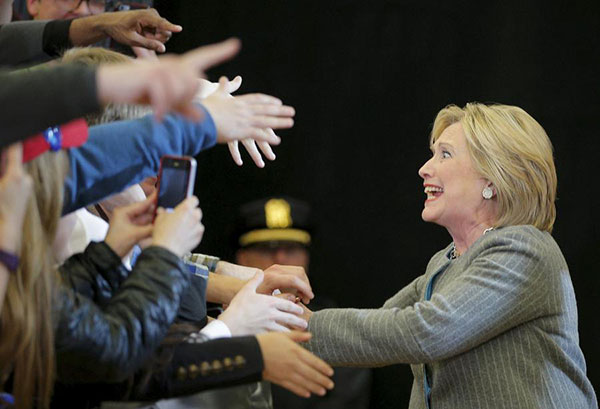Republican Cruz tops Trump in Iowa presidential race, Clinton and Sanders tie
(Agencies) Updated: 2016-02-02 11:37
 |
|
US Democratic presidential candidate Hillary Clinton greets supporters at a campaign rally in Des Moines, Iowa January 31, 2016.[Photo/Agencies] |
MOMENTUM SHIFTS
The results could shift momentum in both races. Clinton hoped for a strong finish against Sanders to vanquish his insurgent candidacy. Sanders is leading in opinion polls in New Hampshire.
Rubio's third-place finish established him as the Republican mainstream alternative to Trump and Cruz.
"I am grateful to you, Iowa. You believed in me when others didn't think it was possible," Rubio, 44, said.
The results could have ramifications going forward.
"There is now blood in the water for Donald Trump," said Republican strategist Ron Bonjean. "Ted Cruz proved he could successfully beat back Trump attacks because he had a great ground game and identified well with evangelical voters."
Former Arkansas Governor Mike Huckabee said he was suspending his campaign for the Republican party nomination. Huckabee won the Iowa caucus in 2008.
Iowa has held the first nominating contests, called caucuses, since the early 1970s, giving it extra weight in the US electoral process that can translate into momentum for winning candidates. The caucuses are voter gatherings that take place in 1,100 schools, churches and other public locations across the Midwestern state.
The 2016 election is shaping up to be the year of angry voters as disgruntled Americans worry about issues such as immigration, terrorism, income inequality and healthcare, fueling the campaigns of Trump, Sanders and Cruz.
Market reaction in Asia to the results was muted, with US stock futures down around half a percent.
"Financial markets might be more comfortable with Hillary (Clinton) than Bernie (Sanders)," said Sean Callow, a strategist at Westpac Bank in Australia.
"There would have to be at least some jitters over the guy who plans to break up the big banks. But it's probably too early to expect the US presidential race to have an impact on the US stock market."






